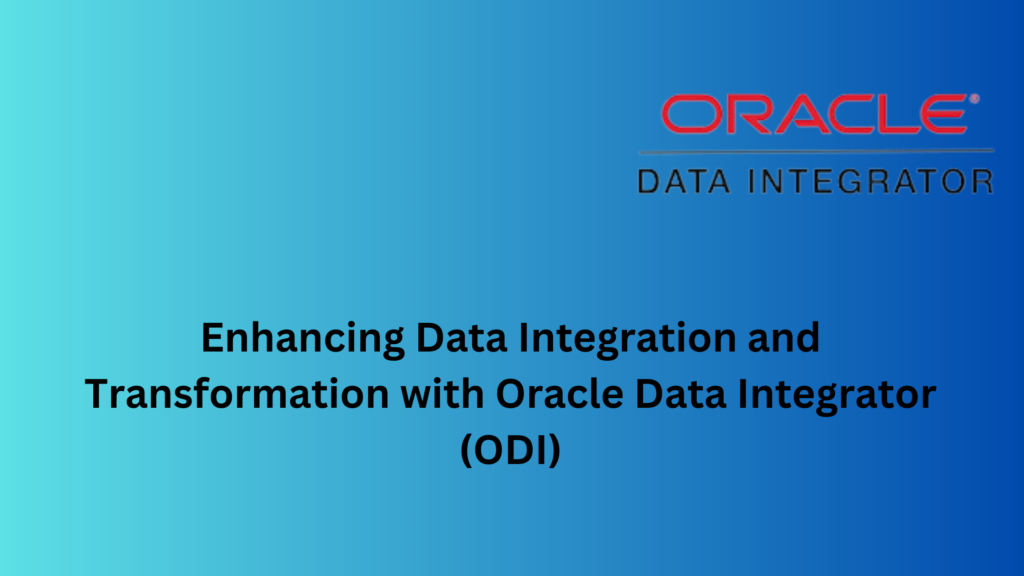Oracle Data Integrator (ODI): Empowering Data Integration and Transformation

Introduction
In today’s data-driven world, organizations are faced with the challenge of managing and integrating vast amounts of data from various sources. This is where Oracle Data Integrator (ODI) comes into play. ODI is a comprehensive data integration platform developed by Oracle Corporation. In this blog, we will explore what ODI is, its usefulness in the modern business landscape, its features, and the benefits it offers to organizations.
What is Oracle Data Integrator (ODI)? Oracle Data Integrator (ODI) is an enterprise-level data integration platform that enables organizations to extract, transform, and load (ETL) data from multiple sources into various target systems. It provides a robust infrastructure for designing, managing, and monitoring data integration processes. ODI offers a graphical interface, making it user-friendly and accessible to both technical and non-technical users.
The key ways in which ODI proves to be highly useful:
ODI plays a crucial role in data integration, ensuring that information flows smoothly across different systems within an organization. It offers several key benefits and use cases:
- Seamless Data Integration: ODI simplifies the process of integrating data from diverse sources, such as databases, files, and applications. It provides a unified and streamlined approach to handle data integration challenges.
- Data Transformation and Enrichment: ODI allows organizations to perform complex data transformations and enrichments, such as data cleansing, data aggregation, and data enrichment, to ensure data accuracy and quality.
- Real-Time and Batch Processing: ODI supports both real-time and batch processing, allowing organizations to handle data integration tasks in near real-time or scheduled intervals, depending on their requirements.
- Heterogeneous Data Integration: ODI supports a wide range of data sources and targets, including relational databases, cloud services, big data platforms, and more. This enables seamless integration across different technologies and environments.
- Data Quality and Governance: ODI includes features for data profiling, data quality monitoring, and data governance, enabling organizations to maintain high data quality standards and compliance with regulatory requirements.
Features of Oracle Data Integrator (ODI):
Let’s delve into the key features that make Oracle Data Integrator a powerful data integration platform:
- Extract, Load, and Transform (ELT) Architecture: ODI follows an ELT architecture, where data extraction, loading, and transformation occur primarily within the target system. This approach leverages the processing power of the target system, resulting in enhanced performance and scalability.
- Knowledge Modules (KMs): ODI provides a library of pre-built Knowledge Modules that encapsulate best practices and methodologies for various integration scenarios. These KMs accelerate development and simplify the implementation of complex data integration processes.
- Integration with Oracle Ecosystem: ODI seamlessly integrates with other Oracle products and technologies, such as Oracle Database, Oracle Business Intelligence (OBIEE), and Oracle GoldenGate. This integration enables a comprehensive and unified data management ecosystem.
- Metadata-Driven Development: ODI adopts a metadata-driven approach, where the metadata repository serves as the central hub for storing and managing integration artifacts. This allows for greater reusability, consistency, and traceability across integration projects.
- Advanced Mapping and Transformation Capabilities: ODI provides a rich set of mapping and transformation capabilities, including drag-and-drop interface, reusable mapping components, data quality transformations, and support for complex business rules.
Benefits of Oracle Data Integrator (ODI):
Implementing Oracle Data Integrator (ODI) offers numerous benefits to organizations seeking efficient and effective data integration solutions:
- Improved Productivity: ODI’s graphical interface and extensive library of pre-built components simplify and accelerate the development of data integration processes, reducing development time and effort.
- Enhanced Scalability and Performance: ODI’s ELT architecture, leveraging the processing power of the target system, enables high scalability and performance even with large volumes of data.
- Increased Data Accuracy and Quality: ODI’s data profiling, data cleansing, and data enrichment capabilities ensure that the integrated data is accurate, consistent, and of high quality.
- Cost Optimization: ODI’s flexible licensing options and efficient use of target system resources help organizations optimize costs associated with data integration projects.
- Agile Data Integration: ODI’s metadata-driven development approach and modular design enable organizations to quickly adapt to changing data integration requirements and deliver projects in an agile manner.
- Comprehensive Monitoring and Management: ODI provides extensive monitoring and management capabilities, allowing organizations to track and optimize data integration processes, identify performance bottlenecks, and ensure smooth operations.
Conclusion
Oracle Data Integrator (ODI) is a powerful data integration platform that enables organizations to efficiently handle complex data integration challenges. With its seamless integration capabilities, extensive features, and numerous benefits, ODI empowers organizations to integrate and transform data from multiple sources into valuable insights and actionable information. By leveraging ODI’s capabilities, organizations can enhance productivity, improve data quality, achieve cost savings, and drive business success in today’s data-driven world.

Leave a Reply